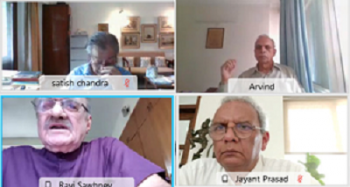The key speakers in the session were Dr. Arvind Gupta, Major ASM Shamsul Arefin (Retd.), Lt General R K Sawhney (Ret.), Ambassador Jayant Prasad, Ambassador Satish Chandra, Dr. Sreeradha Datta, Ambassador Shamsher M. Chowdhury and Ambassador M. Humayun Kabir.
The hasty and chaotic US withdrawal of troops from Afghanistan and the subsequent takeover of Taliban has bewildered the world. The regional balance has changed drastically as there are competing interests and motivations of key players like Pakistan, Russia, China, Iran, Turkey vis a vis the USA, EU/NATO and India. There are also growing concerns of how the Taliban is going to act in future. Countries are establishing relations with Taliban but none of them have given formal recognition to the new regime. In background of the fast paced developments in Afghanistan, Vivekananda International Foundation organized a virtual panel discussion with esteemed speakers from Bangladesh on the topic “Unfolding Developments in Afghanistan and its implications for the region” on Wednesday, October 6, 2021.
Afghanistan has undergone drastic changes in the past few weeks. Since Taliban has illegitimately wrested power it has been building a narrative of a “moderate Taliban” to gain recognition from International community. The messaging is focussed on amnesty, community reconciliation, stability and reconstruction. In fact Taliban spokespersons had made a number of statements indicating formation of an “inclusive,” administration. However, the benign mask of Taliban has gone as the Taliban has formed an overwhelming ethnic, all-male government and is anything but inclusive. A large number of its members are on the UN global list of terrorists. Further there have been reports of escalating violence, gross human rights violations and retributive and ethnic killings. It is becoming clear that Taliban 2.0 is going to be worst, as its worldview remains unchanged, rooted in medieval ideologies. Further there is a looming humanitarian crisis in the making in Afghanistan. More than half a million people have been displaced by the conflict and suffer from acute food insecurity. UNDP has predicted that 97 percent of Afghans could plunge into poverty by mid-2022. Afghanistan remains mired in complexities and uncertainties.
The return of the Taliban and the chaos that has ensued in Afghanistan will have huge repercussions on the region. It will give a fillip to Islamic radicalism including regional and international extremist Islamist groups. It will embolden Islamist terror organisations and Jihadist networks there is likely to be a resurgence of AQ, ISKP in Afghanistan and the relocation of LeT, JeM there. It will also give rise to refugee crisis and illegal drug trafficking further creating instability in the region.
India and Afghanistan have a connection based on shared culture and history. Further India has been an active stakeholder in the reconstruction of Afghanistan, investing nearly US$3 billion in developmental assistance. Its policies have been empathetic to the Afghan people. However, as far the recognition of Taliban led government in Afghanistan is concerned India continues with its wait and watch policy. India firmly has stated that Taliban government in Afghanistan is not inclusive and that the change in regime in Afghanistan happened without negotiation. India is concerned about security implications of the current crisis and prospect of Afghanistan becoming safe haven for terrorist activities. Bangladesh is also concerned about the resurgence of terrorism and influx of refuges. Taliban takeover could further incite homegrown radical Islamist groups and give fillip to Rohingya Muslims in Bangladesh. So far the recognition of the Taliban government is concerned Dacca is following a wait and watch policy; no concrete decision has been taken so far and is closely monitoring the situation in Afghanistan.
The recent developments in Afghanistan do not bode well for global or regional stability. Afghanistan stands on the edge of an abyss. The only thing certain about the current crisis in Afghanistan is uncertainty.








Post new comment